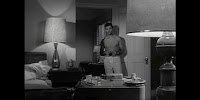You could easily say that I’m a Carroll Baker fan. I
have yet to see everything she’s in but I’ve seen enough to consider myself a proud
connoisseur of her work—especially after catching her in the 1964 Harold
Robbins adaptation of THE CARPETBAGGERS which is long overdue to be spotlighted
on this blog. But as for now, I’d like to focus on SYLVIA, a film she’s made a year later and one that equally
deserves the spotlight.
The film begins when Baker’s just about to marry one
of the wealthiest men in California, played by the still dashing Peter Lawford.
Unbeknownst to her, however, her groom-to-be hires a private detective to do a
background check. This investigator is none other than gay-closeted and
former Playgirl centerfold George Maharis. Maharis goes back to her hometown
and discovers that financially free (!) and talented poet Baker—she has a book
published—holds a big secret that involves a heavy past. I won’t get into all
that but if you enjoy sleaze and melodrama like I do you’ve certainly come to
the right film. Oh boy did you.
Yet surprisingly, underneath all that on-screen craziness
hides a sensitive film worth noticing, mostly due to Baker’s strong performance
as a lost soul. She succeeds in making Sylvia likable and, in return, generates
some form of empathy which of course can only be a good thing. At least that’s
how I felt when I watched the film—twice. As for Maharis, he’s fine as well—so
is Paul Gilbert as a wisecracking drag queen (yes, a drag queen)—but it’s Baker
who impresses the most. I admit, SYLVIA
is not for everyone. It’s hard to watch at times and it’s probably why it got
so panned by the critics but the overall delivery is quite fetching, in my
opinion.
SYLVIA is based on a novel of the same name by best-selling
author Howard Fast who used a pseudonym. Superstar Paul Newman was one time
attached to the project but eventually opted put. The original director, David
Miller (1960 MIDNIGHT LACE starring Doris Day), ended up being replaced by
Gordon Douglas (the delightfully trashy CLAUDELLE INGLISH from 1961). So this
leads to believe the film was a trouble shoot. Also, I remember reading
somewhere that Baker threw a tantrum when she complained to deaf hears about
the script, or something like that.
Despite of all of this, I think the film turns out
better than its reputation makes it out to be. But hey, I’m the guy who thinks
THE LONELY LADY is a great piece of art. In the end it comes down to what turns
you on as a viewer but you’ll certainly be missing something if you fail to
give SYLVIA a try.
Until next post—Martin






No comments:
Post a Comment